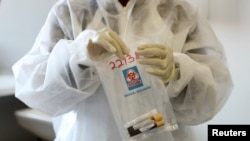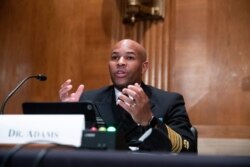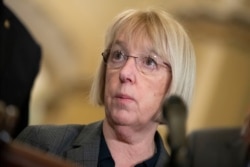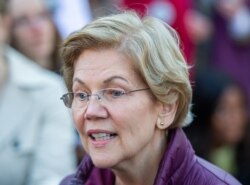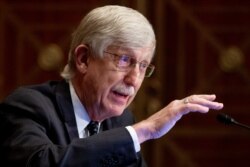Development of a COVID-19 vaccine will not be compromised by outside political considerations, U.S. health experts told lawmakers Wednesday.
The nation's top health officials said the six vaccine candidates currently in large-scale U.S. trials are expected to deliver a result that can be distributed to the most vulnerable populations — including health care workers and first responders — by the end of this year.
"We need to follow the process because the process works," U.S. Surgeon General Jerome Adams told Senate lawmakers Wednesday.
President Donald Trump has made vaccine development an issue in the U.S. presidential election, suggesting his administration's efforts to fast-track a vaccine could yield results by October. If this happened, it would be the fastest ever development of a vaccine for a novel virus.
"Under Operation Warp Speed, we're producing a vaccine in record time. This is a vaccine that we're going to have very soon, very, very soon. By the end of the year, but much sooner than that, perhaps. And this is something that's incredible. This would've taken two or three years by the last administration, and in all fairness, by most other administrations," Trump said Tuesday.
Congressional Democrats have alleged Trump is pushing vaccine development to boost his re-election chances.
"FDA [Food and Drug Administration] scientists' efforts to ensure the safety and efficacy of vaccines must not be undermined by political meddling," said Democratic Senator Patty Murray, the ranking member on the Senate Health, Education, Labor and Pensions Committee.
"CDC's [Center for Disease Control] role in distributing the vaccine and prioritizing who receives the first doses must not be supplanted by politicians or campaign strategists or corporate lobbyists. If we are going to begin to turn the page on this pandemic, people across the country must not have any doubt in this process or in the final product," Murray added.
Democratic Senator Elizabeth Warren said the president's actions have not been helpful in getting the American public to have faith in a vaccine.
"The president has accused FDA officials of being deep state operatives, he's tweeted conspiracy theories about COVID-19 deaths, and he has implicitly tied vaccine development to his reelection campaign," Warren said.
Scientific and safety standards
"I just hope Americans will choose to take the information they need from scientists and physicians and not from politicians," said Francis Collins, Director of the National Institutes of Health (NIH).
Collins detailed the ways Operation Warp Speed has accelerated the vaccine development process while not compromising the scientific integrity of the process.
"We have done that by carrying out steps in parallel that are traditionally done in sequence. We've eliminated downtime by moving into new phases before data from the previous phase is completely analyzed," Collins told lawmakers. "We have started to manufacture doses of all these vaccines before we know if they work, understanding that we are spending hundreds of millions of dollars for vaccine doses that we may have to throw away if they don't work."
Nine U.S. and European companies involved in vaccine development pledged Tuesday to uphold scientific and safety standards in the effort to find a cure for COVID-19.
"We want it to be known that also in the current situation we are not willing to compromise safety and efficacy," said Ugur Sahin, chief executive of Pfizer's German partner BioNTech and one of the co-signers of the pledge.
Another co-signer, AstraZeneca also said Tuesday that it had voluntarily paused late-stage trials of its vaccine due to illness in one of the study volunteers. The company noted this is not an unusual occurrence or response during vaccine development.
The U.S. leads the world in confirmed COVID-19 deaths, with nearly 190,000. The U.S. is also home to a world-leading 6.3 million coronavirus infections, nearly one-quarter of the more than 27.3 million worldwide, according to Johns Hopkins University.
Adams and Collins said the vaccine was still on track to be distributed to the American public by 2021.




